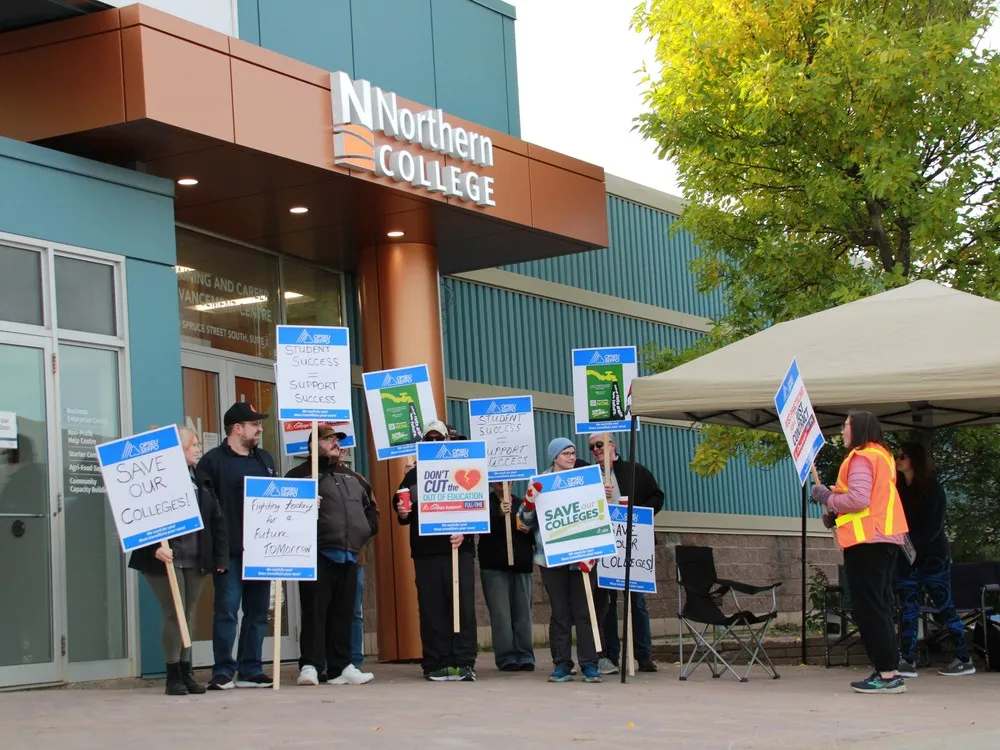
Support workers at Collège Boréal and Northern College have been on the picket line since midnight Thursday, pressing for stronger job security as negotiations with employers stall. In Timmins and across campuses, classes are still running, but picket lines now stand outside Northern’s Second Avenue office and Collège Boréal’s Thériault Boulevard campus – a visible reminder of a dispute that touches students, staff and the wider community.
The strike affects hundreds of workers across both systems. Collège Boréal reports 279 full-time support workers across its eight campuses are covered by the action; Northern College says 150 roles across four campuses are affected. Locally, union leaders have focused less on exact Timmins headcounts and more on solidarity: “We’re united,” says Aaron Miner, local president at Northern’s Local 654.
Who’s on the line? These aren’t just one kind of worker. College support staff cover dozens of jobs: administrative clerks, lab technicians, financial-aid officers, caretakers, daycare staff, employment services, and even registered nurses and medical receptionists attached to campus clinics. At Northern’s Moosonee campus, for example, daycare workers have joined the picket. Still, hospital and clinic services that rely on professional nurses and physicians are continuing – the employer has assured the community that the East End Family Health Team on campus will stay open.
Students are feeling the ripple effects. College administrations say classes will go on, but some supports are harder to access during a job action – things like in-person financial-aid help, certain student services and quick access to loan paperwork may be delayed. Faculty, in many cases, are expected to cross picket lines so students can continue their studies.
At the heart of the dispute is job security. The unions point to a number of recent shifts in how colleges operate: layoffs tied to policy changes on international student visas, increased use of contractors for registrar and IT work, and the creeping use of technology – including artificial intelligence – that could replace human roles. Northern’s Miner says his local lost about 30 jobs in earlier cuts that were never restored, and that in some cases managers have stepped into roles previously held by union members.
“We want language in our contract that stops contracting out and protects our jobs from being taken over or automated,” Miner says. He and other union leaders are calling for clear limits on replacing permanent roles with outside contractors or managerial staff, plus protections around the introduction of new technology so employees can learn new skills rather than be pushed aside.
The strike is only the second of its kind for full-time college support staff in nearly six decades – previous actions took place in 1979 and 2011 – which union leaders say underlines how serious the membership feels about these issues.
The broader backdrop includes a federal cap on international student visas announced in January 2024, which the colleges say has forced them to cut programs and jobs. Northern previously reported anticipated revenue losses of $6–$12 million tied to those policy changes, and unions argue some layoffs stem from chronic underfunding at the provincial level rather than one single policy. Support workers point to reports suggesting Ontario funds colleges at a lower per-student rate compared with other provinces, increasing pressure to chase international tuition as a revenue source.
Not all workers see the situation the same way. At Collège Boréal, which has its own self-imposed cap on international enrolment, francophone programs have brought steady international students – giving some departments a cushion others lack.
Negotiations have been fractious. The College Employer Council says it has offered improvements – from benefits to protections tied to new technology – and has proposed arbitration to limit disruption to students. Union leaders say the offers on the table fall short: they want stronger, contractually binding language preventing contracting out, clear protections from AI replacing staff, and bigger wage increases for lower-paid bands so workers can make ends meet. The employer has floated a two-per-cent annual raise; the union seeks four per cent yearly over three years, arguing many front-line workers are on low pay bands.
For now, union members remain firm on the picket line. “We don’t want to be on strike,” says Dan Brisson, president of the Collège Boréal support workers’ local, “but we have to take this step to get what our members need and deserve.” They’ve filed dozens of bargaining proposals and say they will keep pressing for face-to-face negotiations rather than third-party decisions.
What comes next is uncertain. Students hope for a quick resolution so campus life can return to normal. Community members who rely on campus services want clarity about access and privacy for meetings and clinics. And for the staff on the lines, this is about more than pay: it’s about dignity in work, a future where technology helps rather than replaces them, and job security in a sector that’s been through big changes in a short time.
If you’re a student affected by the strike, check your college’s official channels for service updates and temporary accommodations. If you’re a community member, food banks and campus partners sometimes step in to ensure vulnerable students continue to have support while negotiations continue.



Leave A Comment